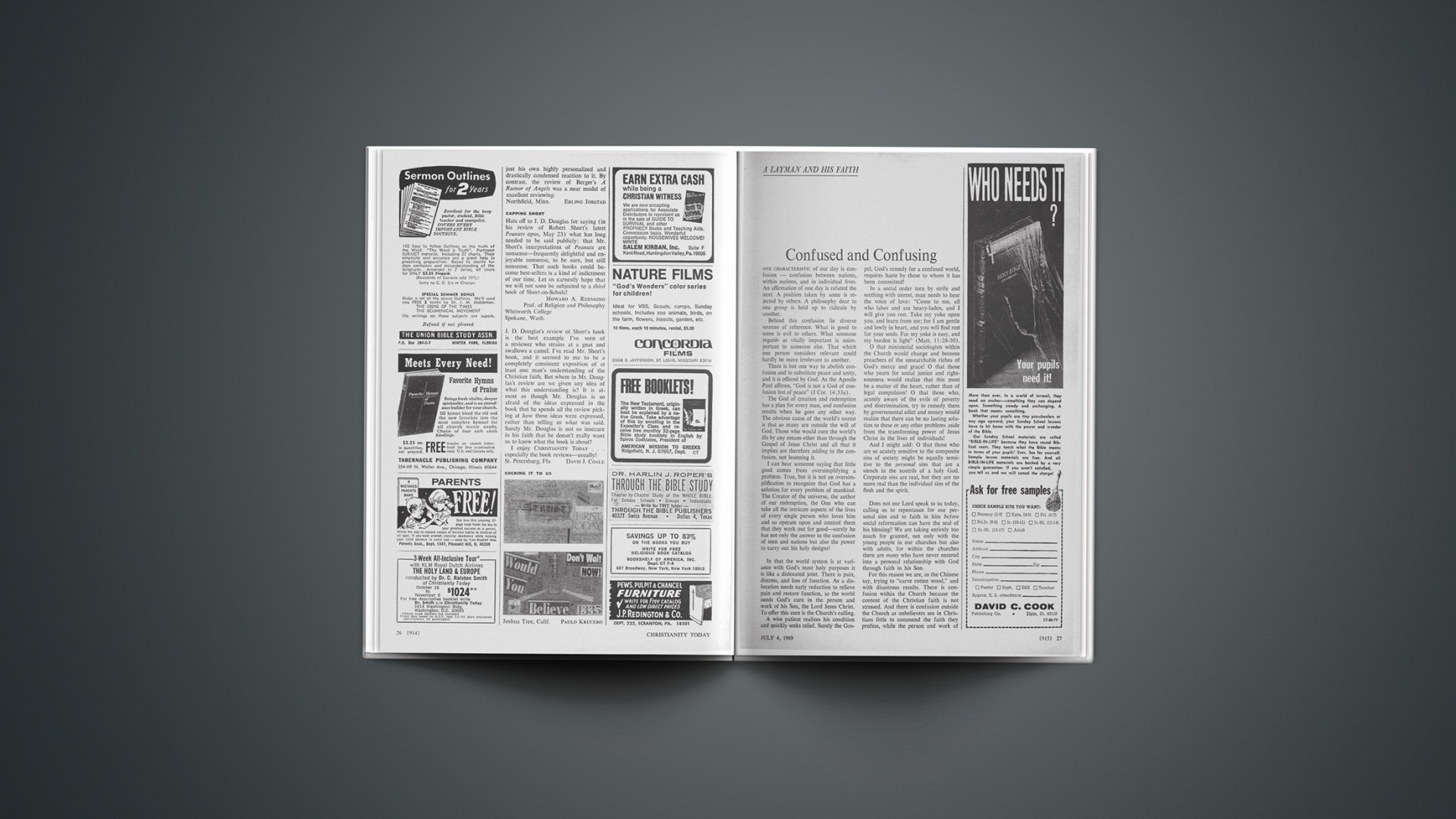One characteristic of our day is confusion—confusion between nations, within nations, and in individual lives. An affirmation of one day is refuted the next. A position taken by some is rejected by others. A philosophy dear to one group is held up to ridicule by another.
Behind this confusion lie diverse sources of reference. What is good to some is evil to others. What someone regards as vitally important is unimportant to someone else. That which one person considers relevant could hardly be more irrelevant to another.
There is but one way to abolish confusion and to substitute peace and unity, and it is offered by God. As the Apostle Paul affirms, “God is not a God of confusion but of peace” (1 Cor. 14:33a).
The God of creation and redemption has a plan for every man, and confusion results when he goes any other way. The obvious cause of the world’s unrest is that so many are outside the will of God. Those who would cure the world’s ills by any means other than through the Gospel of Jesus Christ and all that it implies are therefore adding to the confusion, not lessening it.
I can hear someone saying that little good comes from oversimplifying a problem. True, but it is not an oversimplification to recognize that God has a solution for every problem of mankind. The Creator of the universe, the author of our redemption, the One who can take all the intricate aspects of the lives of every single person who loves him and so operate upon and control them that they work out for good—surely he has not only the answer to the confusion of men and nations but also the power to carry out his holy designs!
In that the world system is at variance with God’s most holy purposes it is like a dislocated joint. There is pain, distress, and loss of function. As a dislocation needs early reduction to relieve pain and restore function, so the world needs God’s cure in the person and work of his Son, the Lord Jesus Christ. To offer this cure is the Church’s calling.
A wise patient realizes his condition and quickly seeks relief. Surely the Gospel, God’s remedy for a confused world, requires haste by those to whom it has been committed!
In a social order torn by strife and seething with unrest, man needs to hear the voice of love: “Come to me, all who labor and are heavy-laden, and I will give you rest. Take my yoke upon you, and learn from me; for I am gentle and lowly in heart, and you will find rest for your souls. For my yoke is easy, and my burden is light” (Matt. 11:28–30).
O that ministerial sociologists within the Church would change and become preachers of the unsearchable riches of God’s mercy and grace! O that those who yearn for social justice and righteousness would realize that this must be a matter of the heart, rather than of legal compulsion! O that those who, acutely aware of the evils of poverty and discrimination, try to remedy them by governmental edict and money would realize that there can be no lasting solution to these or any other problems aside from the transforming power of Jesus Christ in the lives of individuals!
And I might add: O that those who are so acutely sensitive to the composite sins of society might be equally sensitive to the personal sins that are a stench in the nostrils of a holy God. Corporate sins are real, but they are no more real than the individual sins of the flesh and the spirit.
Does not our Lord speak to us today, calling us to repentance for our personal sins and to faith in him before social reformation can have the seal of his blessing? We are taking entirely too much for granted, not only with the young people in our churches but also with adults, for within the churches there are many who have never entered into a personal relationship with God through faith in his Son.
For this reason we are, as the Chinese say, trying to “carve rotten wood,” and with disastrous results. There is confusion within the Church because the content of the Christian faith is not stressed. And there is confusion outside the Church as unbelievers see in Christians little to commend the faith they profess, while the person and work of Jesus Christ are pushed aside in the frantic attempt of some to become “relevant” through social activism.
Suppose a patient should come to a physician with symptoms that proved to be cancer. But the doctor also notices a disfiguring harelip and gives it top priority. For a time the patient might look better, but he would still be dying of cancer.
Many in the Church ignore or play down the fact of sin and its resulting separation of the sinner from God. There is much talk about Jesus as a “revolutionary” and his burning “social consciousness” with little or no mention of the fact that he came into this world to redeem sinners, and that until he is Saviour he cannot be Lord.
But, you say, what about poverty and hunger? Are Christians to ignore the plight of the poor and destitute? And further, how can one effectively preach the Gospel of God’s saving grace to the poverty-stricken? The answer is that this is not an either-or problem but rather one of priorities. When the Church concerns itself chiefly with secular and material needs, it neglects the one thing that can eventually lead to the amelioration of both. Unless the Church keeps its eyes fixed squarely on its God-given task, it will continue to add confusion to a confused world.
When the Church’s interest began to swing away from the central message of the Gospel, it swung toward civil rights. At the moment it is on poverty, and tomorrow it will probably be on peace. What the Church needs to recognize is that without Christ in the hearts of men, civil rights may be no more than a mirage, poverty a continuing blight, and peace an unattainable hope—all because, like a rabbit-chasing bird dog, the Church has left its primary mission and calling.
Furthermore, all the major denominations are now caught up in the movement toward ecclesiastical union, in which organization takes precedence over the content of the Christian faith. Lip service is given to doctrine—but only as a matter to be dealt with after organic union is achieved!
Little wonder that confusion continues. How can there be an effective witness of the Church without clear affirmations about the person and work of Jesus Christ as revealed in Scripture.
But see what happens if one insists on his virgin birth, his miracles, his vicarious atonement for our sins, his bodily resurrection, and his coming again!
If for the sake of unity these are ignored or played down, will such a union be blessed? Will it not add to the confusions of the world?










